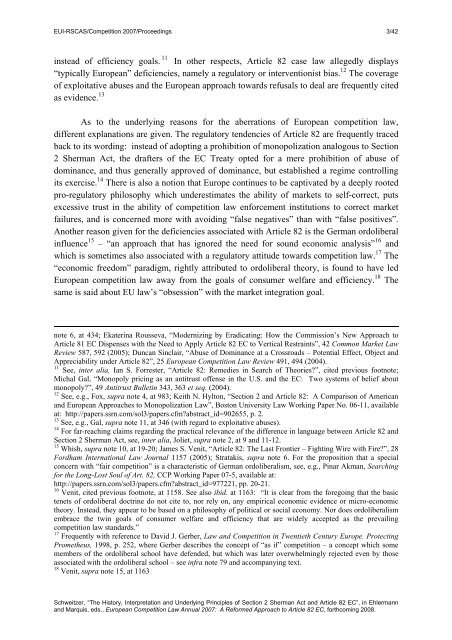The History, Interpretation and Underlying Principles of Section
The History, Interpretation and Underlying Principles of Section
The History, Interpretation and Underlying Principles of Section
You also want an ePaper? Increase the reach of your titles
YUMPU automatically turns print PDFs into web optimized ePapers that Google loves.
EUI-RSCAS/Competition 2007/Proceedings 3/42<br />
instead <strong>of</strong> efficiency goals. 11 In other respects, Article 82 case law allegedly displays<br />
“typically European” deficiencies, namely a regulatory or interventionist bias. 12 <strong>The</strong> coverage<br />
<strong>of</strong> exploitative abuses <strong>and</strong> the European approach towards refusals to deal are frequently cited<br />
as evidence. 13<br />
As to the underlying reasons for the aberrations <strong>of</strong> European competition law,<br />
different explanations are given. <strong>The</strong> regulatory tendencies <strong>of</strong> Article 82 are frequently traced<br />
back to its wording: instead <strong>of</strong> adopting a prohibition <strong>of</strong> monopolization analogous to <strong>Section</strong><br />
2 Sherman Act, the drafters <strong>of</strong> the EC Treaty opted for a mere prohibition <strong>of</strong> abuse <strong>of</strong><br />
dominance, <strong>and</strong> thus generally approved <strong>of</strong> dominance, but established a regime controlling<br />
its exercise. 14 <strong>The</strong>re is also a notion that Europe continues to be captivated by a deeply rooted<br />
pro-regulatory philosophy which underestimates the ability <strong>of</strong> markets to self-correct, puts<br />
excessive trust in the ability <strong>of</strong> competition law enforcement institutions to correct market<br />
failures, <strong>and</strong> is concerned more with avoiding “false negatives” than with “false positives”.<br />
Another reason given for the deficiencies associated with Article 82 is the German ordoliberal<br />
influence 15 – “an approach that has ignored the need for sound economic analysis” 16 <strong>and</strong><br />
which is sometimes also associated with a regulatory attitude towards competition law. 17 <strong>The</strong><br />
“economic freedom” paradigm, rightly attributed to ordoliberal theory, is found to have led<br />
European competition law away from the goals <strong>of</strong> consumer welfare <strong>and</strong> efficiency. 18 <strong>The</strong><br />
same is said about EU law’s “obsession” with the market integration goal.<br />
note 6, at 434; Ekaterina Rousseva, “Modernizing by Eradicating: How the Commission’s New Approach to<br />
Article 81 EC Dispenses with the Need to Apply Article 82 EC to Vertical Restraints”, 42 Common Market Law<br />
Review 587, 592 (2005); Duncan Sinclair, “Abuse <strong>of</strong> Dominance at a Crossroads – Potential Effect, Object <strong>and</strong><br />
Appreciability under Article 82”, 25 European Competition Law Review 491, 494 (2004).<br />
11 See, inter alia, Ian S. Forrester, “Article 82: Remedies in Search <strong>of</strong> <strong>The</strong>ories?”, cited previous footnote;<br />
Michal Gal, “Monopoly pricing as an antitrust <strong>of</strong>fense in the U.S. <strong>and</strong> the EC: Two systems <strong>of</strong> belief about<br />
monopoly?”, 49 Antitrust Bulletin 343, 363 et seq. (2004).<br />
12 See, e.g., Fox, supra note 4, at 983; Keith N. Hylton, “<strong>Section</strong> 2 <strong>and</strong> Article 82: A Comparison <strong>of</strong> American<br />
<strong>and</strong> European Approaches to Monopolization Law”, Boston University Law Working Paper No. 06-11, available<br />
at: http://papers.ssrn.com/sol3/papers.cfm?abstract_id=902655, p. 2.<br />
13 See, e.g., Gal, supra note 11, at 346 (with regard to exploitative abuses).<br />
14 For far-reaching claims regarding the practical relevance <strong>of</strong> the difference in language between Article 82 <strong>and</strong><br />
<strong>Section</strong> 2 Sherman Act, see, inter alia, Joliet, supra note 2, at 9 <strong>and</strong> 11-12.<br />
15 Whish, supra note 10, at 19-20; James S. Venit, “Article 82: <strong>The</strong> Last Frontier – Fighting Wire with Fire?”, 28<br />
Fordham International Law Journal 1157 (2005); Stratakis, supra note 6. For the proposition that a special<br />
concern with “fair competition” is a characteristic <strong>of</strong> German ordoliberalism, see, e.g., Pinar Akman, Searching<br />
for the Long-Lost Soul <strong>of</strong> Art. 82, CCP Working Paper 07-5, available at:<br />
http://papers.ssrn.com/sol3/papers.cfm?abstract_id=977221, pp. 20-21.<br />
16 Venit, cited previous footnote, at 1158. See also ibid. at 1163: “It is clear from the foregoing that the basic<br />
tenets <strong>of</strong> ordoliberal doctrine do not cite to, nor rely on, any empirical economic evidence or micro-economic<br />
theory. Instead, they appear to be based on a philosophy <strong>of</strong> political or social economy. Nor does ordoliberalism<br />
embrace the twin goals <strong>of</strong> consumer welfare <strong>and</strong> efficiency that are widely accepted as the prevailing<br />
competition law st<strong>and</strong>ards.”<br />
17 Frequently with reference to David J. Gerber, Law <strong>and</strong> Competition in Twentieth Century Europe. Protecting<br />
Prometheus, 1998, p. 252, where Gerber describes the concept <strong>of</strong> “as if” competition – a concept which some<br />
members <strong>of</strong> the ordoliberal school have defended, but which was later overwhelmingly rejected even by those<br />
associated with the ordoliberal school – see infra note 79 <strong>and</strong> accompanying text.<br />
18 Venit, supra note 15, at 1163<br />
Schweitzer, “<strong>The</strong> <strong>History</strong>, <strong>Interpretation</strong> <strong>and</strong> <strong>Underlying</strong> <strong>Principles</strong> <strong>of</strong> <strong>Section</strong> 2 Sherman Act <strong>and</strong> Article 82 EC”, in Ehlermann<br />
<strong>and</strong> Marquis, eds., European Competition Law Annual 2007: A Reformed Approach to Article 82 EC, forthcoming 2008.

















